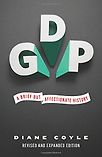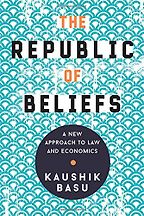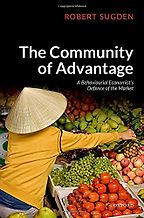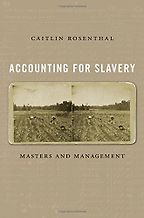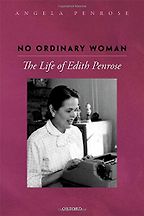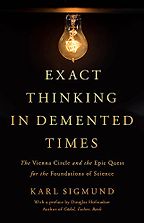How was 2018 as a year for economics books?
It’s been a great year for books, but not with any single theme. It hasn’t been the year for thinking about economic growth or technology or anything like that, I would say. So I’ve read many books that are slightly offbeat in some way, and that’s made it all the more interesting.
The very best economics book of 2018, the one that won your annual Enlightened Economist prize, is The Republic of Beliefs by Kaushik Basu. The subtitle says it offers ‘a new approach to law and economics.’ On the face of it, that doesn’t sound like a spellbinding combination—but tell me why you like it so much.
It’s not a way to turn a book into a bestseller, is it? To have law and economics in the subtitle. What I like about this book is that it addresses an issue that I’ve pondered a long time in thinking about economic policy, which is that policymakers often think about themselves as outside of the society that they’re trying to act upon.
“It’s like a snake eating its own tail. You’ve got to complete the circle to understand how economic policy is going to operate”
If you think about it in game theory terms—and Kaushik Basu is a game theorist—then the person making the laws, making the policies, isn’t part of the game. What he argues is that this makes no sense. We know that in some societies, laws and social norms operate very well, and in others, they don’t. That must be something to do with the structure of the game itself. It’s like a snake eating its own tail. You’ve got to complete the circle to understand how economic policy is going to operate. He makes the law enforcers and the lawmakers part of the ‘game’ of society, and I think that’s an incredibly important insight.
When he writes, ‘we are all citizens of the Republic of Beliefs,’ what does that mean?
It’s an egalitarian approach, if you like, because it brings the policymaker off the pedestal and puts them on the same basis as everybody else in society. It means that you think about policy and law in a different way, too. You don’t think, ‘Here I am, omniscient, figuring out the best thing to do for society.’ You think, ‘I have to figure out what I want to achieve but also what everybody else wants to achieve and how they’re going to react.’ So policy will often be about creating what game theorists call a ‘focal point’—a politician might call it a vision—that will align people towards certain common objectives.
When I spoke to Kaushik Basu for Five Books, he had stepped out of academia to be an economic adviser to the government of India. In the book, there’s a heavy focus on the problem of corruption. Can you explain how that ties in? He talks about corruption in the developing world, but it’s also a problem in developed countries like Italy.
One of the big questions in economics is what distinguishes poor economies from rich ones. The answer seems to be that it’s about the institutional structures and the legal frameworks. Is there corruption or not? Can you rely on other people or not? Kaushik Basu’s approach is a way of thinking about what incentives judges and policemen in a developing country or a country like Italy have, and what it is that makes them act corruptly. When you start to think about their incentives too, you get a better handle on how you might switch from one kind of country into another.
So it’s a book by a game theorist with important implications for public policy.
Yes, and the words game theory shouldn’t put people off, because it’s very accessible. He actually does a really good job of explaining game theory. So it’s not only a good book for policy people and general readers, but if you’re an undergraduate trying to understand game theory, it’s good book for that too.
Yes, there’s a section, ‘Game Theory: A Very Short Introduction,’ which made me think, ‘Ah yes, that’s something I might need.’
It’s as much as anybody needs on game theory.
I always think of the intersection of law and economics in the context of anti-trust, which seems to be a very important area at the moment given the dominance of Google, etc.
Yes, the law and economics toolset does normally get applied in that kind of context. So I think it’s really interesting to extend it to these much broader questions as he is doing in the book.
Last year when we spoke, you recommended Jean Tirole’s Economics for the Common Good as your favourite book of the year. This year’s book is also by an academic. Do you prefer books by academics when it comes to your own favorite economics books?
Yes. When academics can write accessibly, I think those are the best economics books. Many academics are terrible writers, as you know. And there are plenty of really good, popular books about economics written by journalists. I was a journalist myself for a long time, so I don’t disparage them at all. But when you get an academic writing about the area on which they have spent years of research and thinking and they can do that in a way that the general public can understand, then that’s going to be a very powerful book.
Next up, you’ve recommended Robert Sugden’s The Community of Advantage, which I suppose is a quote from John Stuart Mill. The subtitle is ‘A Behavioural Economist’s Defence of the Market.’ Tell me about why you like this book.
The Community of Advantage addresses the same kind of unease I have about economic policy that made me like my first choice—this idea that the policymaker knows better than everybody else. The policymaker stands outside and figures out what to do and then applies the policy to make things better for everybody else. That raises a lot of questions, such as, ‘Well, how do you know what’s better for everybody else?’ And ‘Who are you to say this is the way things should be?’
Rather than game theory, this book looks at behavioural economics. It’s an area that’s become incredibly popular in recent years, and policymakers are trying to adopt behavioural economists’ policies. In a way, that’s even worse than applying the conventional kind of economics, because it’s derived from Skinner’s behaviourist psychology and operant conditioning. It’s been doctored by advertising and marketing people over the years and it’s trying to manipulate people. I’m uncomfortable about saying that not only do policymakers know better, but also that everybody else has these quirky, behavioural biases which mean they make bad decisions for themselves—so we’re going to manipulate them to make them do what’s right for them.
“When you get an academic writing about the area on which they have spent years of research and thinking and they can do that in a way that the general public can understand, then that’s going to be a very powerful book”
What Sugden is arguing is that of course behavioural economists are onto something. There are many contexts in which people make decisions that are not like the rational, calculating homo economicus myth. But we need to think about that in a way that’s not paternalistic and manipulative, as so many behavioural economists do.
This year I read Nudge, which advocates the behavioural economics approach to encourage us to save for our retirement (and other sensible things that so many of us fail to do). If Sugden doesn’t like that approach, presumably he offers an alternative?
His approach is in the spirit of someone like Thomas Schelling, who urges us to think about ways of approaching policy. We know it’s in the interests of people to act in their own interest. This is why I link it to the Kaushik Basu book, because you can very easily frame that in a game theoretical way. You’re trying to figure out what happens when everybody looks out for their own interests, but also responds to what they think everybody else is going to do.
Third on your list is Accounting for Slavery by Caitlin Rosenthal. Why did you include this one in the list of this year’s best economics books?
I picked this book up by chance. It had been sent to me by a publisher and it was just one of those random things, because it’s not my field at all. I found it absolutely compelling. She’s a former management consultant who has gone to the management records of the big slave plantations in the West Indies and the American South. She realised that they started as quite small enterprises, but grew into very large enterprises over time. They professionalized management practice and recorded what they did. This professionalization, in fact, preceded and guided American manufacturing, which is where we normally think Taylorist approaches to management and standardization came from. So that in itself is quite interesting—that those techniques came out of this morally reprehensible set of businesses and then got adapted elsewhere in the economy.
But the book is also really interesting because it speaks to my own interest in understanding what we measure in the economy: how what we think of as data, things that are given, are not natural objects at all, but categories constructed by social practice and power in a society.
So take this idea of people as assets, as capital stock. In economics, everybody talks about ‘human capital.’ We think it’s very positive, because if you use the concept of an asset, you can think about investing in your own future. But it’s sobering to realize that actually, that concept was used in a very different context—a very disturbing one. She has a great line:
Reckoning with the ways planters accounted for slavery should encourage us to rethink the kinds of data we record and how we use it. Quantitative records can help us see farther, but only if we remember what the numbers make visible and what they erase.
I think that’s a very powerful statement.
It’s a very readable book as well, isn’t? It’s about accounting practices, but I think partly because it’s such an awful subject, it’s hard not to read on and find out more. For example, there’s an abstract from a set of accounts with all the slaves listed as stock.
Yes, and children dying is depreciation. Just the level of detail is incredible—for example, that businesses that started selling record books with pre-printed pages so that you could keep better records.
She also makes the point that this was the first separation of ownership and control because often the owner of the plantation was back in England—presumably because owners preferred to delegate the overseeing to someone else.
Originally, planters moved. But then, as the merger of the plantations happened and they grew, it became a professionalized business. There is also a lot of recent work looking at the implications of this for the development of the British financial markets, because many slave owners were British. The investments people made in the plantations helped expand and create the markets for financial instruments in the UK.
So the next book on your list is No Ordinary Woman. It’s a biography of Edith Penrose, written by her daughter-in-law, Angela Penrose. Who was Edith Penrose, and what was her contribution to economics?
Edith Penrose was an American economist who spent most of her career in the United Kingdom and then in France. She was a business economist who researched how companies are organized. Her work was on multinationals and the oil industry in particular. She’s the sort of name I had vaguely heard of before, but again, this was a book I picked up slightly at random. It’s a really compelling life story.
What’s interesting is that she’s almost faded out of economics. She was much better known in the 1970s because of the oil crisis and the development of multinationals. People knew her work then, but it has completely vanished and dropped off the radar. I think that’s partly because she was a female economist, and it’s always been a very male-dominated profession.
Get the weekly Five Books newsletter
But it’s partly also because her approach was not very algebraic. She was working at a time when that became the thing that you did to be counted as a brilliant economist. She set up the economics department at SOAS, part of the University of London, but she ended up working in business schools rather than economics departments.
More recently, economists have been rediscovering a lot of the things that she had found—in a non-mathematized way—about the organization of very large companies that operate across national boundaries.
There’s not much about her economics in this particular book, but it sent me to her own book, which was called The Theory of the Growth of the Firm. This theorizing about why companies turn from normal, small companies into large conglomerates is what she was thinking about.
So we’re at an annual economics festival right now and earlier there was a talk about “the great economists” of history. Only one woman, Joan Robinson, featured. Is that because women have been written out of the history of economics? Or did they never get a chance to do the work in the first place?
I’ve been pondering this and did a talk about it here in Bristol last year. I think the really distinctive thing about economics—and maybe one or two other subjects, like philosophy and computer science—is that there’s a very narrow concept of what makes somebody brilliant. It’s about showy intellectual games of a certain kind and if you don’t do that, you don’t count. And I don’t think women can be asked to do that. It’s just stupid stuff, isn’t it? The insight you get from reading Edith Penrose’s book about the dynamic of firm growth is that it’s just as good as the later algebraic versions of the same thing.
So who does that work normally get attributed to?
I guess it would be people like Oliver Williamson and that institutional tradition. He did some fantastic work and he deserved his Nobel Prize for it, but it’s not an enormous leap from what she was doing.
I read Myra Strober’s memoir, Sharing the Work. She’s a bit older than we are, but despite a PhD in economics from MIT, she had a nightmare getting taken seriously as an academic economist.
That era was obviously diabolically bad for women academics. We complain now, but looking back, we shouldn’t.
Do you think it is better now?
It’s a little better. You’re not expected to stop working when you get married. That’s progress.
Let’s move to the last 2018 economics book on your list: Exact Thinking in Demented Times by Karl Sigmund, which is about the Vienna Circle. Tell me why this book appealed.
It appealed to me because of the title. I love the title. I’d seen some random reference saying it was a brilliant book and when I’m really busy, a nice little treat is to buy a book (although then, often, I’ve got no time to read it). So I bought it and I found it a really good read. I don’t know much about the Vienna Circle, or logical positivism, or mathematics or quantum physics, and a lot of it’s about that. But what I liked about it is that it’s one of those intellectual histories that tells you the story of a time and place, and relates that context to why the ideas turned out the way they did. This was obviously Vienna between the wars—a particularly fragile time, looking back at it. Hence, I suppose, ‘demented’ in the title.
Logical positivism does have some link to economics. Obviously it affected philosophy and gave us that linguistic turn in philosophy which always made me so impatient because I thought, ‘Why on earth are they debating these trivial differences in meaning when it’s perfectly clear what it means? Just pull yourself together!’ But it also affected economics, through Lionel Robbins in particular. Robbins wrote a book in 1932 called An Essay on the Significance of Economic Science and he was much influenced by logical positivism.
His argument was that you could separate the positive and the normative aspects of economics. In other words, you could separate means and ends. It wasn’t the job of economists to talk about the ends of public policy or the management of the economy. That was for politicians or the people to debate and was about moral values. It had nothing to do with the economist who was a technocrat looking at positive means to the end that had been determined somewhere else.
This was a complete break with tradition in welfare economics. Pigou had explicitly said that you can’t separate the values from the recommendations that you make. Though it’s not in the book, there is this link to economics, which is why it’s worth understanding logical positivism.
There’s also some nice stuff in the book about early visualizations. One of the members of the Vienna Circle was called Otto Neurath and he invented data visualization. He set up an institute for pictorial statistics and they came up with these pictures of little human figures that you see so much in data visualizations these days. He had a whole museum in Vienna devoted to data visualizations of the economy and society.
So you feel we should know about the Vienna Circle, in general?
I feel we should know about it in general, yes.
The other issue it raised for me was thinking about the times. We live in demented times as well, don’t we? I’ve been finding it very troubling reading writers from that era. Another is Stefan Zweig, who wrote a fantastic book called The World of Yesterday. He and his wife fled Austria before the Nazis started imprisoning Jews. He talked about that boiling-the-frog phenomenon. People carried on living their normal lives and things got worse little bit by little bit. And by the time they realized it had changed a lot it was too late. So most of them didn’t escape. It’s that sense of the fragility of all this brilliance in demented times that I found quite poignant about this book.
Five Books aims to keep its book recommendations and interviews up to date. If you are the interviewee and would like to update your choice of books (or even just what you say about them) please email us at [email protected]
Five Books interviews are expensive to produce. If you've enjoyed this interview, please support us by donating a small amount.

